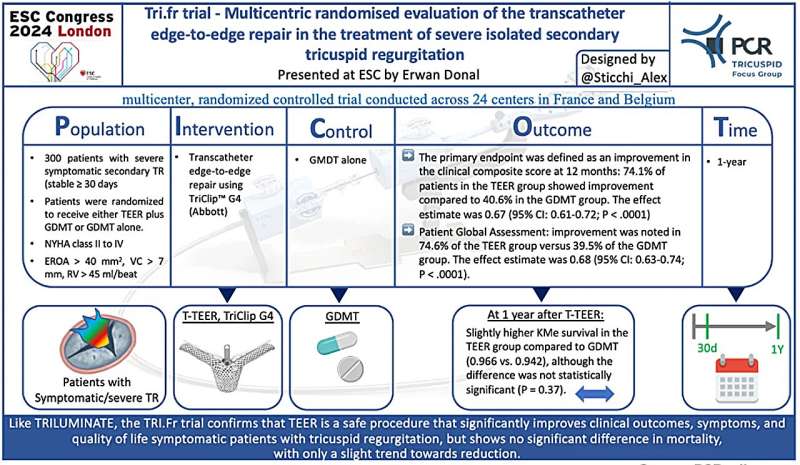
Tricuspid transcatheter edge-to-edge repair (T-TEER) significantly reduced the severity of secondary tricuspid regurgitation and improved quality of life after one year, according to research presented in a Hot Line session August 31 at ESC Congress 2024.
Tricuspid regurgitation (TR) can result from intrinsic abnormalities of the tricuspid valve (i.e., primary TR), remodeling of right heart chambers (i.e., secondary TR) or cardiac implantable electronic devices. It can cause fatigue and accumulation of fluid in the abdomen and lower limbs. Patients may have severe functional deficits because of reduced cardiac output, with renal and liver impairment.
Professor Erwan Donal from the Hospital of Rennes, France, explained why the Tri.fr trial was conducted. “Patients with severe secondary TR often have reduced quality of life and a poor prognosis, with many ineligible for surgery due to the associated risks.
“In common with others, we were interested in exploring T-TEER as a new treatment option and we conducted the investigator-led Tri.fr trial to test this approach on top of optimal medical therapy. The benefits of T-TEER plus strict medical therapy and management in terms of reducing the impact of TR on patients’ daily lives are highly encouraging.”
The Tri.fr trial was an open-label randomized trial conducted in patients who had symptomatic, severe secondary TR despite medical management, were stable for at least 30 days and were ineligible for surgical correction. Participants were randomized in a 1:1 ratio to receive either T-TEER in addition to optimal medical treatment or optimal medical treatment alone.
The primary endpoint was the Packer composite score (combining New York Heart Association [NYHA] class, patient global assessment [PGA] and major cardiovascular events: all-cause mortality, cardiovascular mortality, tricuspid valve surgery, heart failure hospitalizations, cardiovascular and non-cardiovascular hospitalizations). Secondary endpoints included components of the primary composite, severity of TR assessment and quality-of-life improvement using the Kansas City Cardiomyopathy Questionnaire score (KCCQ).
In total, 300 patients were recruited from 24 centers in France and Belgium. The mean age was 78 years and 54% were women. In total, 40% had been hospitalized for heart failure within one year before enrollment, and 15% had a cardiac implantable electronic device.
Rates of clinical composite endpoint improvement were higher in the T-TEER group than in the control group (74.1% vs. 40.6% respectively; p
Lower rates of hospitalization and death were observed in the T-TEER group, although the trial was not designed to detect statistically significant differences in these outcomes.
Quality of life significantly improved in the intervention vs. the control group. The overall KCCQ score at 1-year follow-up was 69.9 (standard deviation [SD] 25.5) with the intervention compared with 55.4 (SD 28.8) in the control group (p
“We clearly showed the benefits of T-TEER, as seen in the TRILUMINATE trial,2 but using T-TEER as part of a global approach and treating heart failure with guideline-directed medical management and follow-up.
“A key message of the Tri.fr trial is that implementing rigorous multidisciplinary medical management resulted in a low event rate, even in very ill patients with secondary TR. Using T-TEER with optimal medical management also led to important quality-of-life improvements.
“It remains to be seen if patients with a particular phenotype of severe TR derive more benefit from T-TEER than others. We expect to provide more insightful outcomes data in the coming years as we continue to follow-up the trial participants,” concluded Professor Donal.
More information:
Study overview: Multicentric randomised evaluation of the transcatheter edge-to-edge repair in the treatment of severe isolated secondary tricuspid regurgitation
Citation:
New evidence for benefits of transcatheter edge-to-edge repair in secondary tricuspid regurgitation (2024, September 2)
retrieved 2 September 2024
from https://medicalxpress.com/news/2024-09-evidence-benefits-transcatheter-edge-secondary.html
This document is subject to copyright. Apart from any fair dealing for the purpose of private study or research, no
part may be reproduced without the written permission. The content is provided for information purposes only.


